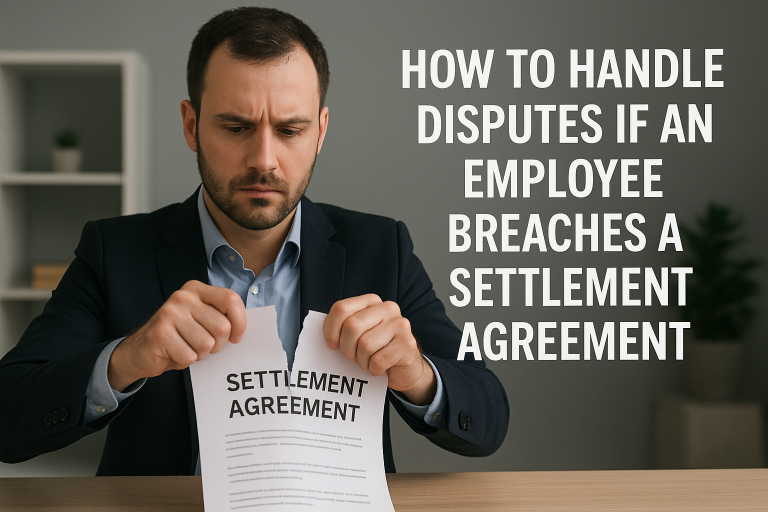Understanding Settlement Agreements
A settlement agreement is a legally binding contract between an employer and an employee that usually ends the employment relationship on mutually agreed terms. In exchange for compensation or benefits, the employee agrees not to pursue certain legal claims (such as unfair dismissal or discrimination).
Once signed, both parties are legally required to follow the agreed terms. However, disputes can arise when one side — often the employee — breaches the agreement.
Contact Us Today!
Please fill in the form and we will get back to you within 24 hours.

❌ What Is Considered a Breach of a Settlement Agreement?
A breach occurs when an employee fails to comply with one or more conditions stated in the agreement. Common examples include:
Disclosing confidential information to third parties.
Making negative or defamatory remarks about the employer.
Reapplying for employment in breach of a non-rehire clause.
Breaching a non-compete or non-disclosure clause.
Failing to return company property or documents.
Any of these actions can lead to legal consequences, depending on the terms of the contract.
Contact Us Today!
Please fill in the form and we will get back to you within 24 hours.
🧭 Steps to Handle an Employee Breach
1. Review the Agreement Carefully
Check the specific clause the employee is alleged to have breached. Ensure that the term is clearly worded, reasonable, and enforceable under UK law.
2. Gather Evidence
Collect any relevant proof — emails, messages, witness statements, or public posts — showing the breach occurred. Solid evidence is key if legal enforcement becomes necessary.
3. Attempt an Informal Resolution
Before escalating, contact the employee in writing to notify them of the breach. Sometimes, a simple reminder or mediation can resolve the matter amicably and preserve your reputation.
4. Consult a Settlement Agreement Solicitor
Seek advice from an employment law solicitor. They can help you:
Interpret complex clauses.
Determine whether a genuine breach has occurred.
Advise on proportionate responses or formal legal action.
5. Take Legal Action (If Necessary)
If informal methods fail, the employer can:
Withhold unpaid compensation (if not yet fully paid).
Claim damages for any financial loss.
Apply for an injunction to stop ongoing breaches (e.g., leaking data or contacting clients).
Legal action should always be a last resort, as settlement agreements are designed to avoid litigation.
Get a Free Settlement Estimate – See What You Could Be Owed
⚖️ Employer Rights and Remedies
Employers are entitled to seek enforcement of the terms agreed upon. Depending on the case, potential remedies include:
Damages claim – to recover losses caused by the breach.
Injunction – to prevent further harmful actions.
Termination of benefits – if ongoing payments depend on compliance.
However, remedies must be reasonable and proportionate, and the employer must not breach the agreement themselves.
🤝 Preventing Future Breaches
To reduce the risk of disputes:
Draft clear, specific, and enforceable clauses.
Include a repayment clause for serious breaches.
Ensure the employee receives independent legal advice before signing.
Keep communication professional and well-documented.
💡 Key Takeaways
A settlement agreement is legally binding for both employer and employee.
Breaches can lead to financial or legal consequences.
Employers should always seek professional legal advice before taking action.
Clear drafting and fair communication help prevent disputes from escalating.
🏛️ Need Expert Help with a Settlement Agreement Dispute?
At Solidaire Solicitors, our employment law team can:
Review your existing agreement,
Advise on your legal position, and
Handle any dispute or breach efficiently and confidentially.
📞 Contact us today for expert legal support on settlement agreement breaches and ensure your rights are fully protected.
Contact Us Today!
EXCELLENT





